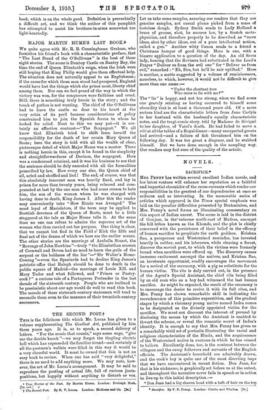THE SECOND POST.t THIS is the felicitous title which Mr.
Lucas has given to a volume supplementing The Gentlest Art, published by him three years ago. It is, so to speak, a second delivery of letters. "For the music that counts," says some sage, "give me the double knock "—we may forget the tingling electric bell which has superseded the familiar hound—and certainly if all the postmen's wallets were filled in this way it would be a very cheerful world. It must be owned that this is not an easy book to review. When one has said "very delightful," there is no need to add anything more. We may note, how- ever, the art of Mr. Lucas's arrangement. It may be said to reproduce the postbag of actual life, full of curious juxta- positions, but happily without anything to disturb or vex.
+ True Stories of the Past. By Martin Hume. London: Erehigh Nash. rte. net.] r The-Second Post. By E. Y. Lucas. London: Methuen and Co. Cread Let us take some samples, assuring our readers that they are genuine samples, not casual plums picked from a mass of tasteless dough. Sydney Smith sends to Lady Holland a brace of grouse, shot, he assures her, by a Scotch meta. physician, and therefore properly to be described as "mere ideas, shot by other ideas, out of a pure intellectual notion, called a gun." Another witty Canon sends to a friend a Christmas hamper of good things. Here is one, with a bizarre application to a (ideation of the day. An old Scots lady, bearing that the Revisers had substituted in the Lord's Prayer "Deliver us from the evil one" for "Deliver us front evil," remarked : "Eh, Sire, but he'll be sair uplifted." Here is another, a motto suggested by a volume of reminiscences, nameless, to which, however, it would not be difficult to givis more than one name
Under the chestnut tree Who cares to lie with me?"
The " lie " Is happy, and not too strong, when we find some one gravely relating as having occurred to himself some absurdity that is at least a thousand years old. Of a more serious kind are the characteristic letters from Jane Carlyle to her husband with the husband's equally characteristic notes, and the tragi-comic story, tOld by Madame de Sevigne to her daughter, of Valera death. He had failed to serve a rot/ at all the tables of a Royal dinner—many unexpected guests had arrived—and a failure of fish threatened him on the following day. It was too great a disgrace, and he stabbed himself. But we have done enough in the sampling way. Our readers may feel sure of the quality of the article.










































































 Previous page
Previous page